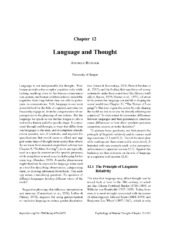Language and thought
Chapter, Peer reviewed
Published version

Åpne
Permanent lenke
https://hdl.handle.net/1956/23700Utgivelsesdato
2019Metadata
Vis full innførselSamlinger
Originalversjon
https://doi.org/10.17885/heiup.470.c6675Sammendrag
According to the principle of linguistic relativity, most prominently proposed by Whorf, the language we speak affects the way we think. Three theses are central to this account: that languages differ in how they describe the world; that the way in which a language describes the world affects the experiences had by its speakers; and that speakers of different languages therefore have different experiences. The underlying idea is still controversial in parts of cognitive science, but evidence is accumulating in support of its three most plausible readings, namely that language may affect thought in terms of thinking before language (as thinking for speaking), with language (as meddler or as augmenter), and after language (as spotlight). In this chapter, we summarize research on four domains, to illustrate arguments and approaches in the field. In order to raise awareness for critical issues, we begin with grammatical gender, originally claimed as an instance of the spotlight effect, but used here as a counter-example. More convincing instances are spatial references (for the spotlight effect), the influence of the color lexicon on color categorization (language as meddler), and the role of number words for numerical cognition (language as augmenter). In conclusion, we elaborate on the role of language as a tool for thought, including the differences that occur when using a foreign language while thinking.
